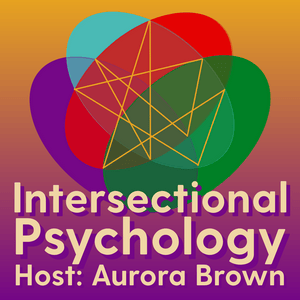35 episodes
- What happens when feminism is treated as universal — despite emerging from very unequal histories and contexts?
In this episode of Intersectional Psychology, I compare Anglo-American feminism and African feminisms, asking what gets lost when Western feminist frameworks are exported as the default lens for understanding gender, power, and justice.
Drawing on African feminist scholarship and decolonial theory, this episode explores how feminism looks different when it is shaped by colonial histories, economic inequality, community-based survival, and collective responsibility — rather than liberal individualism.
🎁 Support the podcast and get exclusive bonus content at Patreon.com/IntersectionalPsychology.
🌈 If this episode resonates, please share it, rate the show, and send us your thoughts.
📄 Download a transcript of this episode on IntersectionalPsychology.com.
⏳ Chapter Timestamps
00:00:00 Pre-credit teaser
00:01:22 Land acknowledgement
00:01:50 Title credits
00:02:17 Introduction to African vs Anglo-American feminism
00:04:18 Anglo-American feminism: Who is it really for?
00:07:42 The problem with universal womanhood
00:09:46 African feminism: Context is not optional
00:13:15 Why Anglo-American feminism still falls short
00:16:18 Intersectionality: Why this is personal
00:17:55 South Africa, apartheid, and compounded oppression
00:22:28 Why African feminism matters
00:26:32 End credits
Stay connected
🔗 Subscribe wherever you get your podcasts
📮 Got feedback or questions? Reach out at @IntersectionalPsychology or IntersectionalPsychologyPod[@]gmail.com
You can contribute to the Palestine Children's Relief Fund at https://www.pcrf.net/
References
Ahmed, S. (2000). Whose Counting? Feminist Theory, 1(1), pp. 97-103 [online]. Available at: https://doi.org/10.1177/14647000022229083 (Accessed 10 July 2024)
Bakare-Yusuf, B. (2003). Beyond Determinism: The Phenomenology of African Female Existence. Feminist Africa, 2 [online]. Available at: https://www.jstor.org/stable/48724973 (Accessed 10 July 2024)
Bakare-Yusuf, B. (2004) '"Yoruba's don't do gender": A critical review of Oyeronke Oyěwùmí's The Invention of Women: Making an African Sense of Western Gender Discourses', in Arnfred et al. (2004) African Gender Scholarship: Concepts, Methodologies and Paradigms. Dakar: Council for the Development of Social Science Research in Africa.
Camminga, B. (2020) 'Disregard and danger: Chimamanda Ngozi Adichie and the voices of trans (and cis) African feminists', The Sociological Review, 68(4), pp. 817-833. Available at: https://doi.org/10.1177/0038026120934695 (Accessed 10 July 2024)
Carrera-Fernández, M. V., & DePalma, R. (2020). Feminism will be trans-inclusive or it will not be: Why do two cis-hetero woman educators support transfeminism? The Sociological Review, 68(4), pp. 745-762 [online]. Available at: https://doi.org/10.1177/0038026120934686 (Accessed 10 July 2024)
Connell, R.W. (1985) 'Theorising gender', Sociology, 19(2), pp. 260-272.
Crenshaw, K. (1991) 'Mapping the Margins: Intersectionality, Identity Politics, and Violence Against Women of Colour', Stanford Law Review, 43(6), pp. 1241-1299 [online]. Available at: https://www.jstor.org/stable/1229039 (Accessed 10 July 2024)
DiAngelo, R. (2018) White fragility: why it's so hard to talk to white people about racism. Boston: Beacon Press.
Dosekun, S. (2019) 'African feminisms', in Yacob-Haliso, O. & Falola, T. (eds.), The Palgrave Handbook of African Women’s Studies [online]. Available at: https://doi.org/10.1007/978-3-319-77030-7_58-1 (Accessed 10 July 2024)
Eddo-Lodge, R. (2017) Why I'm No Longer Talking to White People about Race. London: Bloomsbury Circus.
Garutsa, T.C. & Nekhwevha, F. (2019) 'Decreasing Reliance of Indigenous Knowledge Systems in Rural Households: The Case of Khambashe, Eastern Cape, South Africa', Africa Insight, 49(1) [online]. Available at: https://www.ajol.info/index.php/ai/article/view/188718 (Accessed 10 July 2024)
Gqola, P.D. (2001) 'Defining people: Analysing power, language and representation in metaphors of the New South Africa', Transformation 47, pp. 94-106 [online]. Available at: https://www.africabib.org/htp.php?RID=P00021717 (Accessed 10 July 2024)
Gqola, P.D. (2005) 'Through Zanele Muholi's eyes: re/imagining ways of seeing Black lesbians', in Tamale, S. (ed.) African Sexualities: A Reader. Wantage: Pambazuka Press. pp. 622-629.
Hill Collins, P. (1996) What's in a Name? Womanism, Black Feminism, and Beyond', The Black Scholar, 26(1), pp. 9-17 [online]. Paradigm Publishers. Available at: http://www.jstor.org/stable/41068619 (Accessed 10 July 2024)
Kisiang'ani, E.N.W. (2004) 'Decolonising Gender Studies in Africa', in Arnfred et al. (2004) African Gender Scholarship: Concepts, Methodologies and Paradigms. Dakar: Council for the Development of Social Science Research in Africa.
Lewis, D. (2004) 'African Gender Research and Postcoloniality: Legacies and Challenges', in Arnfred et al. (2004) African Gender Scholarship: Concepts, Methodologies and Paradigms. Dakar: Council for the Development of Social Science Research in Africa.
Lewis, D. (2001) 'Introduction: African Feminisms', in Agenda: Empowering Women for Gender Equity, 2001, No. 50, African Feminisms One, pp. 4-10 [online]. Taylor & Francis. Available at: https://www.jstor.org/stable/4066401 (Accessed 10 July 2024)
Lewis, D. (2011) 'Representing African sexualities', in Tamale, S. (ed.) African Sexualities: A reader, pp. 199-216. Wantage: Pambazuka Press.
Mazibuko, M. (2020) 'Being a Feminist in the Fallist Movement in Contemporary South Africa', Critical Times, 3(3), pp. 488–495 [online]. Available at: https://doi.org/10.1215/26410478-8662368 (Accessed 10 July 2024)
Mbugua, A. (2011) 'Gender dynamics: a transsexual overview', in Tamale, S. (ed.) African Sexualities: A Reader, pp. 238-246. Wantage: Pambazuka Press.
Msimang, S. (2002) 'Introduction: African Feminisms II: Reflections on Politics Made Personal', Agenda: Empowering Women for Gender Equity, 54, pp. 3-15 [online]. Taylor & Francis. Available at: https://www.jstor.org/stable/4548069 (Accessed 10 July 2024)
Nkealah, N. (2017) 'Cameline Agency: A New Agenda for Social Transformation in South African Women’s Writing 2012–2014', Current Writing: Text and Reception in Southern Africa, 29(2), pp. 121-130. Available at: https://doi.org/10.1080/1013929X.2017.1347426 (Accessed 10 July 2024)
Oyěwùmí, O. (2004) 'Conceptualising Gender: Eurocentric Foundations of Feminist Concepts and the Challenge of African Epistemologies', in Arnfred et al. (2004) African Gender Scholarship: Concepts, Methodologies and Paradigms. Dakar: Council for the Development of Social Science Research in Africa.
Oyěwùmí, O. (1997) The Invention of Women: Making an African sense of Western gender discourses. Minneapolis: University of Minnesota Press.
Saad, L.F. (2020) Me and White Supremacy: Combat Racism, Change the World, and Become a Good Ancestor. Naperville: Sourcebooks.
See Privacy Policy at https://intersectionalpsychology.com/privacy-policy/ - This mini episode shares updates for Intersectional Psychology in 2026, including a new biweekly release schedule, ongoing Patreon benefits, and a preview of upcoming series on GBV, disability, democracy, climate justice, migration, and the return of Intersectional Scenes.
🎁 Support the podcast and get exclusive bonus content at Patreon.com/IntersectionalPsychology.
📄 Download a transcript of this episode on IntersectionalPsychology.com.
Stay connected
🔗 Subscribe wherever you get your podcasts
📮 Got feedback or questions? Reach out at @IntersectionalPsychology or IntersectionalPsychologyPod[@]gmail.com
You can contribute to the Palestine Children's Relief Fund at https://www.pcrf.net/
See Privacy Policy at https://intersectionalpsychology.com/privacy-policy/ - Season 3 of Intersectional Psychology focuses on trans and gender-diverse healthcare, rights, and resistance, with a particular emphasis on South Africa and the African continent. This episode challenges myths and centres lived experience, offering evidence-based insight and a clear-eyed look at the political realities shaping care and access today.
🎁 Support the podcast and get exclusive bonus content at Patreon.com/IntersectionalPsychology.
🌈 If this episode resonates, please share it, rate the show, and send us your thoughts.
📄 Download a transcript of this episode on IntersectionalPsychology.com.
⏳ Chapter Timestamps
00:00:00 Land acknowledgement
00:00:28 Title credits
00:01:09 Introduction to transgender health and rights
00:02:02 The actual access to gender-affirming health care (GAHC)
00:04:49 Affirmation is the first step
00:06:41 Non-medical gender-affirming practices
00:11:19 It goes all the way to the top!
00:14:40 What is hormone therapy in GAHC actually?
00:20:26 What is gender-affirming surgery actually?
00:22:31 Exporting "Eden": God, guns, and glossy pamphlets in Africa
00:30:11 Platforms of harm, laws of hope
00:33:12 The Gospel according to gaslight
00:41:01 Receipts, resistance, and raising hell
00:51:43 Don't feed the trolls, but don't starve yourself either
00:56:54 Love, families, and finding your people
01:00:11 End credits
Stay connected to Aurora and Intersectional Psychology
🔗 Subscribe wherever you get your podcasts
📮 Got feedback or questions? Reach out at @IntersectionalPsychology or IntersectionalPsychologyPod[@]gmail.com
You can contribute to the Palestine Children's Relief Fund at https://www.pcrf.net/
See Privacy Policy at https://intersectionalpsychology.com/privacy-policy/ - This Best Of Season 2 episode of Intersectional Psychology brings together key moments from a season focused on decolonising mental health practice.
Host Aurora Brown, Registered Counsellor, is joined by Shaheeda Sadeck and Neesha Chhiba, two Registered Counsellors working at the intersections of psychology, culture, spirituality, community care, and social justice. Together, they explore how colonial histories, apartheid, religion, racism, Islamophobia, homophobia, and global political violence continue to shape mental health — particularly in South Africa.
🎁 Support the podcast and get exclusive bonus content at Patreon.com/IntersectionalPsychology.
🌈 If this episode resonates, please share it, rate the show, and send us your thoughts.
📄 Download a transcript of this episode on IntersectionalPsychology.com.
⏳ Chapter Timestamps
00:00:00 Land acknowledgement
00:00:28 Title credits
00:01:23 Introduction to decolonising mental health
00:10:04 Decolonial practice with children
00:18:34 How social practice and multiculturalism enhance psychology
00:24:39 Trauma-informed child mental health care
00:30:38 Impact of Islamophobia on the mental health of Muslims in SA
00:35:58 Mental health of Queer Muslims in Cape Town
00:41:15 How parents can support their children's mental health
00:45:36 From SA to Palestine: Ongoing decolonial work
00:48:24 Power, freedom, and difference in mental health care
00:53:13 Trauma-informed self care
00:56:30 End credits
Stay connected to Aurora and Intersectional Psychology
🔗 Subscribe wherever you get your podcasts
📮 Got feedback or questions? Reach out at @IntersectionalPsychology or IntersectionalPsychologyPod[@]gmail.com
You can contribute to the Palestine Children's Relief Fund at https://www.pcrf.net/
See Privacy Policy at https://intersectionalpsychology.com/privacy-policy/ - What is intersectional psychology — and why does it matter so much for mental health today?
In this Best of Season 1 episode, Aurora Brown brings together key moments from all four episodes of Dissecting Intersectional Psychology, offering a rich and accessible introduction to intersectionality, social justice, and their ethical relevance to psychology and counselling practice.
This episode also grapples honestly with psychology’s history — including its complicity in systems like apartheid and eugenics — and asks what accountability, repair, and ethical practice require of us today. Along the way, Aurora reflects on coalition-building, civil disobedience, and how mental health professionals can engage in advocacy without abandoning care, nuance, or humility.
Whether you’re a psychology professional, student, activist, or someone navigating the mental health system yourself, this episode offers language, frameworks, and courage for thinking differently about care.
Aurora will be taking a short recording break over the festive season, but episodes will continue to drop — starting with this Season 1 retrospective.
🎁 Support the podcast and get exclusive bonus content
Patreon.com/IntersectionalPsychology
🌈 If this episode resonates, please share it, rate the show, and send us your thoughts.
📄 Download a transcript of this episode on IntersectionalPsychology.com.
⏳ Chapter Timestamps
00:00:00 Land acknowledgement
00:00:28 Title credits
00:01:23 Welcome and introduction
00:03:33 Intersectionality in practice
00:12:47 Practical social justice advocacy in psychology
00:22:10 Psychology's historical missteps
00:34:24 Civil disobedience and systemic change
00:43:21 The empathetic, ethical, and empowered counsellor
00:53:12 End credits
Stay connected to Aurora and Intersectional Psychology
🔗 Subscribe wherever you get your podcasts
📮 Got feedback or questions? Reach out at @IntersectionalPsychology or IntersectionalPsychologyPod[@]gmail.com
You can contribute to the Palestine Children's Relief Fund at https://www.pcrf.net/
More Health & Wellness podcasts
Trending Health & Wellness podcasts
About Intersectional Psychology
The podcast that explores psychology’s role in promoting social justice. Because everyone deserves to live with their optimal mental health. Content includes up-to-date peer-reviewed research, interviews with experts and people with lived experience, and a monthly guided mindfulness/relaxation session. Bonus content available weekly on Patreon.We are committed to the Cite Black Women praxis.
Podcast websiteListen to Intersectional Psychology, The Mindset Mentor and many other podcasts from around the world with the radio.net app

Get the free radio.net app
- Stations and podcasts to bookmark
- Stream via Wi-Fi or Bluetooth
- Supports Carplay & Android Auto
- Many other app features
Get the free radio.net app
- Stations and podcasts to bookmark
- Stream via Wi-Fi or Bluetooth
- Supports Carplay & Android Auto
- Many other app features


Intersectional Psychology
Scan code,
download the app,
start listening.
download the app,
start listening.




































